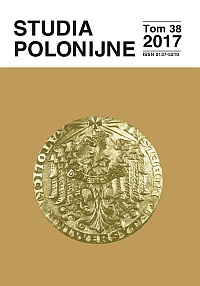The Problem of Protecting Polish Cultural Heritage in Lithuania
Main Article Content
Abstract
Successive generations go by, yet there remain the accomplishments of their material and non-material culture, bearing testimony to their life and activity. They speak about their creators but also about the state they were citizens of. This heritage of past generations has great importance for present and future generations. It defines a human, protects his or her identity, gives the feeling of belonging, integrates him or her with other members of the community, creates common memory and social sensitivity. It is the duty of the state to protect cultural heritage, which is a token of presence of people who lived in the territory of the Republic of Poland over centuries. A huge amount of that heritage lies within the areas of the Marches of the old Commonwealth of Poland, which now belong to neighbouring sovereign states. The Polish state is interested in keeping in good condition its witnesses of history and, together with its neighbouring counties, it takes up initiatives which aim to restore their past glory. It has a moral right to do it, and even a duty towards past generations, which for centuries have created Polish culture in those areas, shaping patriotic attitudes and values. This also poses a huge challenge and at the same time is a task to pass on to future generations everything that is valuable from the more-than-one-thousand-year-old heritage.
Article Details
References
Hermann M., Kresowe korzenie Polaków. Komunikat z badań, Warszawa: Centrum Badania Opinii Społecznej 2012, BS/50/2012, http://www.cbos.pl/SPISKOM.POL/2012/K_050_ 12.PDF [dostęp: 30.07.2017].
Lithuanian 2011 Population Census in Brief, Lietuvos Statistikos Departamentas 2012, https:// osp.stat.gov.lt/documents/10180/217110/Lietuvos_gyventojai_2011.pdf [dostęp: 30 lipca 2017] .
Pruszyński J., Dziedzictwo kultury w świetle Konstytucji Rzeczypospolitej Polskiej z 2 kwietnia 1997 roku, w: Konstytucja i władza we współczesnym świecie. Doktryna – prawo – praktyka, red. M. Kruk, J. Trzciński, J. Wawrzyniak, Warszawa 2002.
Sarnecki P., Komentarz do art. 5, w: Konstytucja Rzeczypospolitej Polskiej, t. I, red. L. Garlicki, M. Zubik, Warszawa 2016.
Słownik języka polskiego, red. M. Szymczak, t. I, Warszawa 1993.
Słownik poprawnej polszczyzny PWN, red. W. Doroszewski, Warszawa 1993.
Zeidler K., Prawo ochrony dziedzictwa kultury, Warszawa 2007.

